Reliable maritime file transfer is increasingly critical for keeping vessels in regulatory compliance, distributing updates to vessels, collecting data from vessels, and avoiding interruptions in ship operations.
Achieving this in predictable time frames is a challenge due to the scarce/unreliable network connections, blackout spots, inefficient transfer methods, and more.
We know this from experience, as many of our maritime industry users — like Lindblad Expeditions, Ross Maritime, and Northern Maritime Group — came to us because they needed a reliable, automated solution for transferring files from ship to shore (and vice versa) that works in the most extreme network conditions.
Resilio Platform is purpose-built for reliably transferring and synchronizing files of any size across unreliable and low-bandwidth networks such as VSAT used in maritime. Resilio is easy to manage, monitor, and centrally control. Operations can be fully automated in support of one- and two-way transfers or moving files in any direction.
Resilio’s P2P replication architecture and proprietary WAN optimization protocol enable organizations to reliably and efficiently distribute and sync mission-critical files in any scenario, regardless of network conditions, vessel location, fleet size, and file size.
Want to see how fast Resilio can sync files to and from your fleet? Schedule a demo with our team.
In this article, you’ll learn how Resilio’s features enable maritime organizations to reliably and efficiently transfer files across their entire fleet. We’ll also use case studies from four of our clients to illustrate how Resilio helps overcome maritime challenges and execute mission-critical operations.
Specifically, we’ll discuss Resilio’s:
- Reliable transfer over any network: Resilio’s proprietary WAN transfer protocol fully utilizes the available bandwidth of any type of internet connection (VSAT, cell, Wi-Fi, IP, UHF), regardless of round-trip delay and packet loss. And its distributed P2P architecture enables syncs to occur from ship to ship in a “store-forward” fashion, so you can distribute data to and collect data from vessels no matter where they are.
- Fault-tolerance: Resilio automatically resumes failed transfers from the point of interruption until the job is complete. It can dynamically route around outages and cache data for local sharing and offline access during network interruptions (then automatically syncs when back online).
- Automated and centrally managed: From one centralized location, you can manage your entire replication environment, adjust bandwidth allocation at each endpoint, monitor job status, generate reports, and more. Resilio’s robust scripting capabilities enable you to automate all jobs, script any type of functionality your job requires, and integrate with tools you already use.
- Flexible and easy to use: Resilio is a vendor-agnostic solution that you can deploy on your existing IT infrastructure (without needing new hardware) using just about any type of device, operating system, and cloud storage service. Its native file system browser interface makes it easy to share files, download files, and collect mission-critical data.
- Secure: Resilio includes state-of-the-art security features that were reviewed by 3rd-party security experts. It secures data end-to-end and protects you from ransomware, data corruption, and data interception.
Maritime organizations such as Lindblad Expeditions, Northern Marine Group, Ross Maritime, and more rely on Resilio to automate file transfers for their fleets in predictable time frames. To learn more about how Resilio can enhance your maritime operations, schedule a demo with our team.
Efficient, Optimized Transfers over Any Network
Synchronizing data with your fleet is vital to modern maritime operations. But file transfers at sea are plagued by latent, spotty, low-bandwidth internet connections. And most of the workarounds that maritime organizations use to overcome these connectivity issues — such as FTP, Microsoft SCCM, and transfers via physical devices — are too time-consuming and cumbersome.
But Resilio Platform enables maritime organizations to easily, and reliably overcome these issues by using:
- A proprietary WAN acceleration protocol, known as Zero Gravity Transport™ (ZGT), that fully utilizes the bandwidth of any connection no matter how low-quality.
- A P2P replication architecture that allows organizations to distribute and sync files from ship to ship for faster and achieve reliable data replication.
WAN Acceleration with Zero Gravity Transport
ZGT is a technology that’s custom-built for wide-area maritime communications. It intelligently analyzes the underlying network conditions (such as latency, packet loss, and throughput over time), learning and adjusting to these conditions in real-time in order to maximize bandwidth utilization.
It can fully utilize any type of network connection — such as VSAT, cell (3G, 4G, 5G), Wi-Fi, point-to-point HF, and UHF — and efficiently transfers data at the fastest possible speeds.
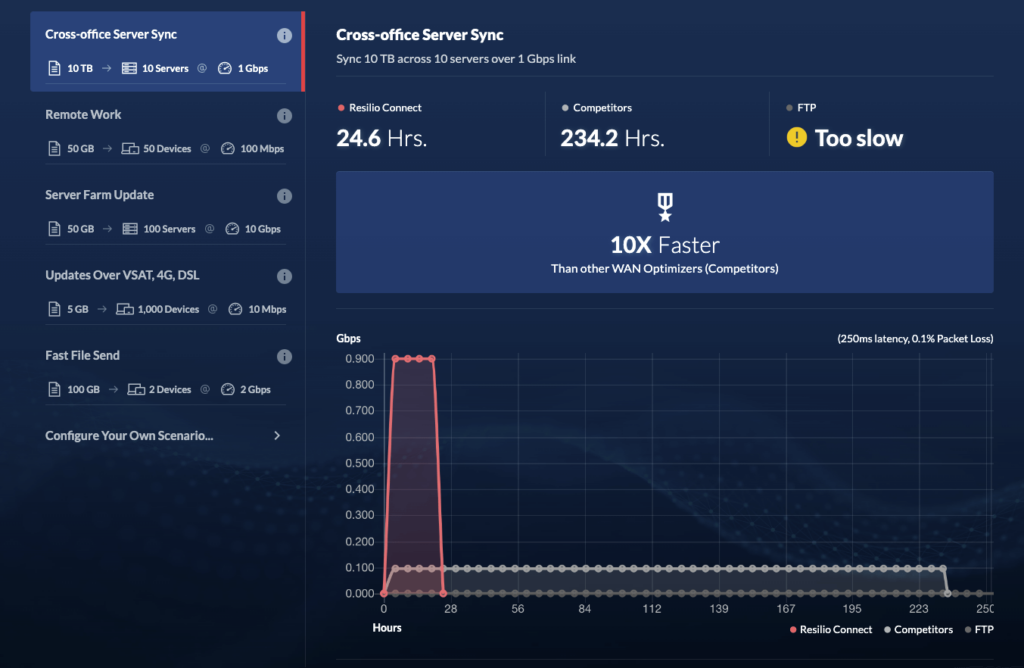
Resilio efficiently utilizes available network bandwidth via:
- A congestion control algorithm: ZGT’s congestion control algorithm constantly probes the RTT (Round Trip Time) of a network in order to identify and maintain the ideal data packet send rate and a uniform packet distribution over time.
- Interval acknowledgements: Unlike other transfer protocols (such as TCP), ZGT doesn’t wait for acknowledgements to send each data packet. Instead, it sends acknowledgements for groups of packets that includes additional info about lost packets — which increases transfer speed.
- Delayed retransmission: ZGT retransmits lost packets in groups once per RTT, to reduce unnecessary retransmissions that consume precious bandwidth.
- Transferring only file deltas: In all sync situations, Resilio efficiently replicates only the changed portions of files to minimize usage on expensive metered connections and provide faster transfer speeds.
This technology allows Resilio to deliver transfer speeds 100x greater than existing solutions, reaching up to 10 Gbps per server. No matter how large your data payloads are, you can rest assured knowing your data will reliably sync even when connectivity is poor.
Distributed Peer-to-Peer Replication
Most file transfer solutions use a hub-and-spoke architecture. This architecture consists of a hub server and multiple remote servers. The remote servers can’t share data with each other directly, as all file transfers must first go through the hub server.
In maritime operations, this means that all file transfers must go from HQ to a vessel (or vice versa). This is an unreliable way to transfer files at sea since vessels are constantly changing locations and subject to varying levels of connectivity and even blackout spots.
Resilio’s P2P replication architecture eliminates this issue. In a P2P replication environment, any server with a Resilio agent on it can share data directly with any other server, without the need to route through a hub server. And each endpoint can share data simultaneously.
Imagine you want to sync a file across five endpoints. Resilio uses a process known as file chunking to split that file into several chunks that can transfer independently from each other. Endpoint 1 can share a file chunk with Endpoint 2. While it waits to receive the remaining file chunks, it can immediately share the first file chunk with any other endpoint.

Soon, every endpoint will be sharing file chunks simultaneously, allowing you to sync your environment 3-10x faster than with traditional solutions.
So, while Resilio can be configured in a hub-and-spoke deployment, it can also transfer files from ship to ship in a “store-forward” fashion. This means you can:
- Distribute data to hard-to-reach vessels: If you need to deliver mission-critical updates or files to a specific vessel that’s in a very low-connectivity area, you can first transfer to a nearby vessel and then transfer from vessel to vessel until the data reaches its destination.
- Quickly sync your entire fleet: You can quickly sync data across your entire fleet. HQ can first sync with a nearby vessel. That first vessel can sync with another nearby vessel. Then both vessels can sync with other nearby vessels, and so forth.
- Quickly sync from ship-to-shore: The reverse is also true. Ships can quickly transfer/sync data from vessel to vessel, all the way back to HQ.
Operate in the Most Extreme Conditions
Resilio’s combination of WAN optimization and P2P replication enables you to collect and control data at the far edge of networks under the most extreme conditions, where most solutions would fail. And it does so efficiently and effectively, allowing organizations to eliminate bottlenecks and inefficiencies in order to streamline workflows.
For example, our client Lindblad Expeditions operates in extremely remote areas, such as the Baltics, Patagonia, Antarctica, South East Asia, Alaska, etc. Their operations require ships to send invoices and daily expedition reports back to HQ, as well as update the fleet maintenance software on each vessel.
In these low-connectivity areas,connections frequently drop and applications time out, causing a build-up of data retransmissions and a large consumption of bandwidth. Critical data would queue up behind retransmitted files, leading to more dropped connections, timeouts, and operational degradation.
Before switching to Resilio, their solution was to allocate each ship with a set time to transfer files based on their position and satellite connection. Crew members were forced to spend hours supervising these transfers. In addition to wasting crew time, this process was inefficient, unreliable, and riddled with human error. If transfers failed to complete in the allotted time, the crew would have to wait another four hours before trying again.
Switching to Resilio eliminated this issue for them entirely, enabling Lindblad’s crew and IT team to:
- Transfer anytime: Ships can send and receive data at any time. Resilio’s ZGT protocol adjusts to and maximizes the available network connection no matter where a ship is located, so they no longer need to wait for allotted transfer windows.
- Quickly sync from ship-to-shore (and vice versa): With Resilio’s P2P architecture, HQ can sync software and databases (as well as distribute content to specific ships) reliably and conveniently.
- Eliminate headaches and bottlenecks: Crews no longer need to monitor transfers or wait for transfer windows. Staff can use Resilio’s user-friendly graphic interface (which we’ll discuss more later) to simply drop content into folders, knowing that the data will always reach its destination and allowing them to consistently meet deadlines.
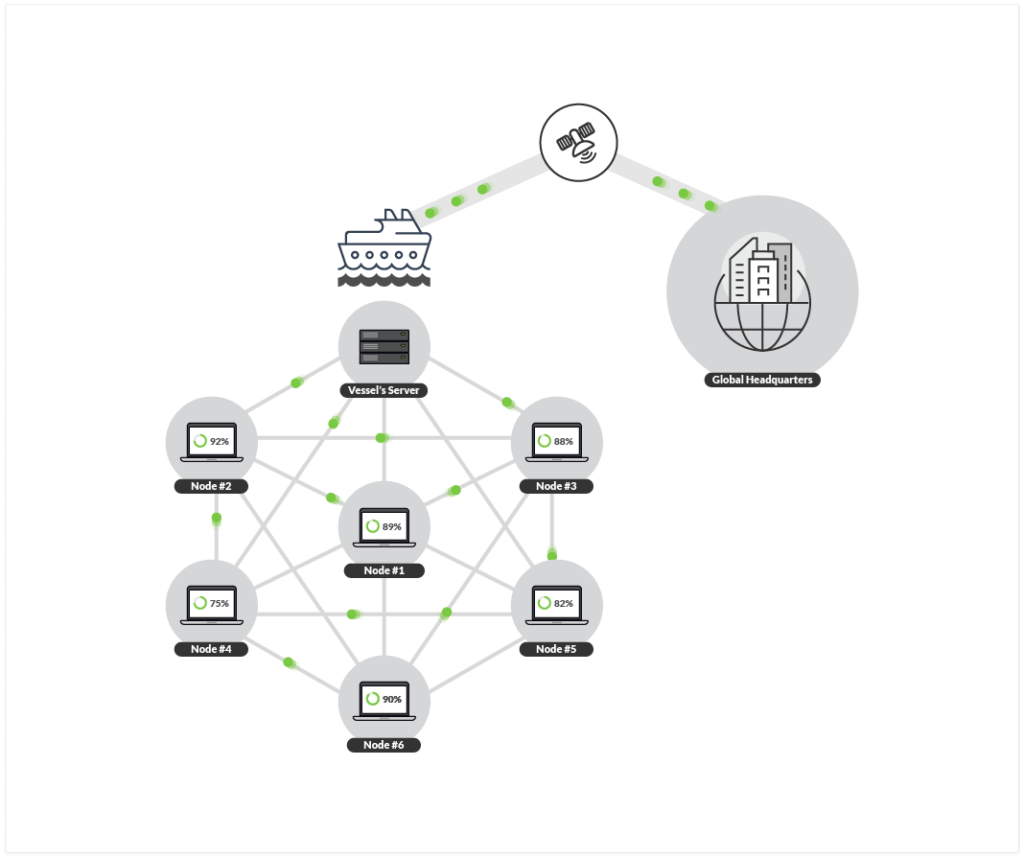
You can read more about how Resilio helps Lindblad Expeditions achieve reliable data transfer here.
Reliability and Fault Tolerance
Shipping companies and other maritime organizations must operate in difficult, error-prone conditions. Despite this, keeping crews and ship software up-to-date with the latest versions of files and updates is critical to maintaining business operations, streamlining workflows, and avoiding costly mistakes and fines.
In addition to being able to fully utilize any network and transfer files from ship to ship, Resilio also includes other capabilities that make it incredibly reliable and fault-tolerant. No matter what situations you find yourself in, you can rest assured knowing that Resilio will dependably deliver files in suitable time frames thanks to:
- Checkpoint restart: Resilio retries all file transfers until they’re complete. And if a file transfer is interrupted, Resilio will perform a checkpoint restart to resume the transfer at the point of failure to make efficient use of the costly satellite data network.
- Dynamic rerouting: If any endpoint or network goes offline, Resilio can dynamically reroute around the failure to maintain data availability and meet deadlines.
- Cryptographic data integrity validation: Resilio uses cryptographic hashing of each file chunk and each complete file to preserve data integrity across all endpoints.
- No single point of failure: Resilio eliminates single points of failure, since every Resilio agent can share files directly with each other. So if any endpoint goes down, the necessary files or services can always be retrieved from any other endpoint.
- Network prioritization: Resilio can make use of multiple networks on a ship. You can configure it to minimize usage of satellite links, take full advantage of Wi-Fi connections, make more use of cellular, etc.
- Caching and offline access: You can cache data locally at each endpoint so you can still access files when networks go down. Files can also be shared across LANs. And when the internet connection is reestablished, Resilio will automatically sync files across your entire environment.
For example, one of the world’s largest marine construction companies uses Resilio to distribute software updates to their fleet of ships. Each ship has a central server and 20-40 workstations onboard that need to be updated.
Before switching to Resilio, they used Microsoft SCCM to update ships — which required data transmission from HQ directly to each individual workstation. This occurred over spotty network connections that frequently dropped out. As a result, their team couldn’t reliably distribute updates and mission-critical systems on vessels were often years behind on security updates.
But with Resilio, they’re able to simply transmit the updates from HQ to each ship’s central server. Then, using Resilio’s scripting automation capabilities (which we’ll discuss more later), Resilio automatically delivers the updates to each workstation over the LAN — all while their IT team manages and monitors the entire process remotely.
You can read more about how the marine construction company uses Resilio to reliably and remotely update their software here.
Automation and Centralized Management
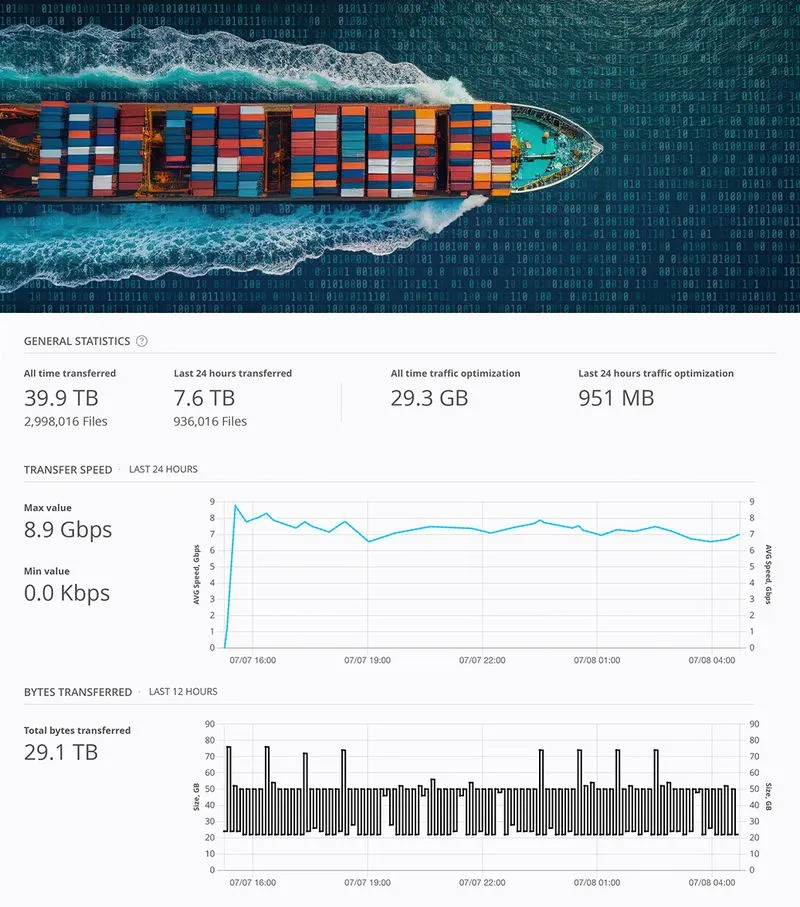
The two case studies we’ve mentioned illustrate one of the biggest challenges of traditional maritime file transfer solutions: decentralization and cumbersome distribution processes.
Organizations in the maritime industry must often transfer large files to vessels over poor-quality networks. To overcome connectivity issues, these companies are forced to hamstring labor-intensive solutions aboard each ship with little visibility and control from IT teams at HQ.
But Resilio provides maritime companies with the centralized management and automation capabilities they need to overcome these challenges.
Centralized Management with Resilio’s Management Console
While you can use Resilio with command-line scripts, our solution also provides an easy-to-use graphic interface that gives you centralized, granular control over file transfers at each endpoint in your environment.
Using the Management Console, you can:
- Control all endpoints from one location: Resilio provides visibility into the status of transfers at each endpoint. You can check the status of each replication job and transfer files to specific endpoints from one centralized location.
- Monitor job execution and status: You can visualize and monitor each transfer, view performance metrics, and configure notifications on job status to be delivered directly to email or Webhooks.
- Review logs and job history: Resilio maintains system-wide event logging for security audits. Logs are stored in standard JSON format that’s compatible with event processing solutions like Splunk, LogRhythm, Loggly, Grafana, and more.
- Control file priorities: You can prioritize replication jobs and file distribution to align with your needs and business requirements.
- Control bandwidth allocation: You can control bandwidth allocation at each endpoint. You can even create bandwidth profiles that govern how much bandwidth is allocated to each endpoint at certain times of the day and on certain days of the week. This enables you to minimize the impact on the network and avoid interfering with crew communications/tasks.
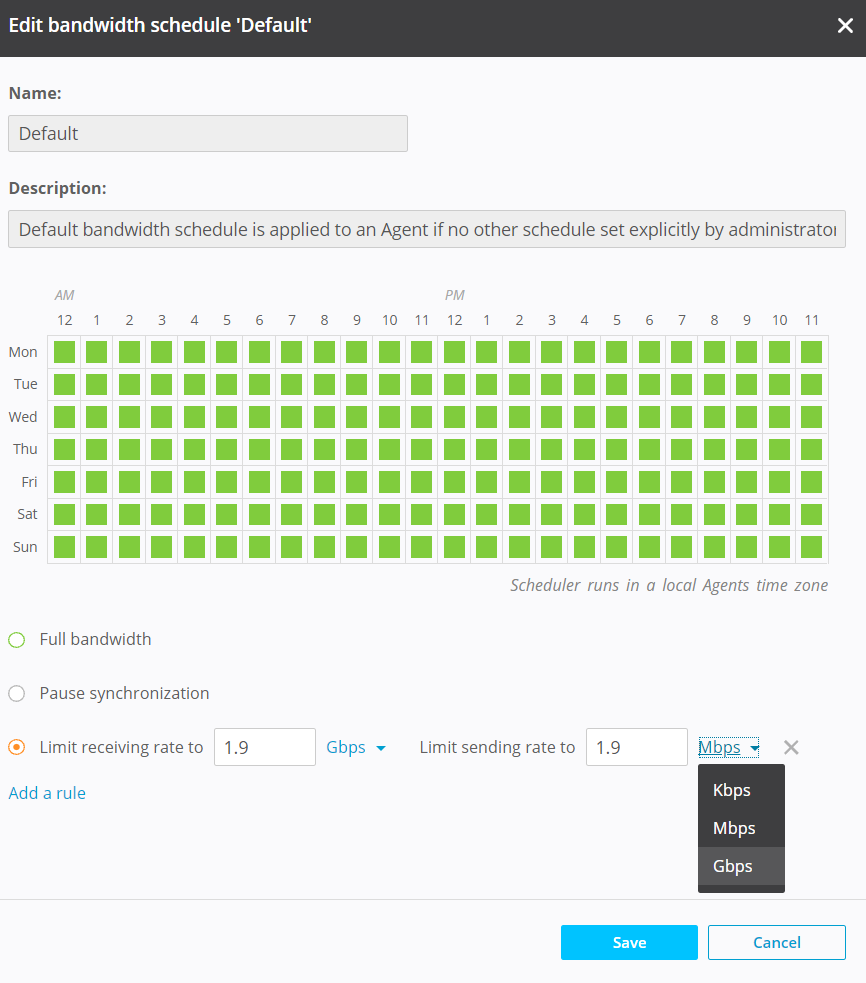
Advanced Scripting and Job Automation
Maritime companies can take advantage of Resilio’s REST API to script any type of functionality their transfer jobs may require. This allows companies to distribute updates and collect files with ease and minimal human intervention — making life easier for ship crews and IT teams and freeing them up to work on other tasks.
With Resilio’s API, you can integrate Resilio into your organizations workflows using three types of scripting triggers for transfer jobs:
- Prior to starting a transfer job
- After a machine completes a transfer
- After all machines complete a transfer
In other words, you can automate how Resilio initiates/executes transfers and what your machines do after transfers are complete. You can even automate troubleshooting processes, such as file conflict resolution.
Northern Marine Group is an organization that provides ship management and marine services to customers across the globe. They need to collect data from and sync data to their fleet of geographically distributed vessels (oil tankers, gas carriers, and a small cruise vessel).
To update ship software, they need to push out multi-gigabyte updates to each vessel over spotty satellite connections and often to ships in blackout spots like the Indian Ocean. Before switching to Resilio, they conducted this process by mailing CDs with the updates on them to each ship and guiding a crew member on how to properly install the update remotely. As a result, bringing their full fleet into compliance could take six months.
They also had to perform frequent health checks on each ship’s maintenance systems and manifests, which required syncing the ships internal database over SMTP (Simple Mail Transfer Protocol). These syncs could take 12-20 hours. And if they failed at any point, the entire sync had to be restarted from scratch.
Northern Marine Group now uses Resilio to update their ships, configuring custom scripts that automatically distribute and install updates before reporting back on status. They can manage the entire process remotely with minimal human intervention and bring their full fleet into compliance in just two weeks — 92% faster than their previous solution.
Vessel health checks also run automatically every six hours, enabling their team to remotely monitor systems, identify which are likely to cause problems, and proactively fix them before issues occur.
You can read more about how Resilio helped Northern Marine Group reduce update distribution time by 92% here.
Flexibility and Ease of Use
Unlike many other file transfer solutions, Resilio Platform is incredibly flexible and easy to use.
Resilio supports just about any type of:
- Device: You can install Resilio on file servers, NAS/DAS/SAN devices, laptops, desktops, mobile devices (Resilio offers iOS and Android apps), IoT devices, and virtual machines.
- Cloud storage service: Resilio supports just about any S3-compatible cloud object storage, such as AWS S3, GCP, Azure, Wasabi, MinIO, Backblaze, and more.
- Operating system: Resilio supports Windows, MacOS, Linux, Unix, Ubuntu, FreeBSD, OpenBSD, and more.
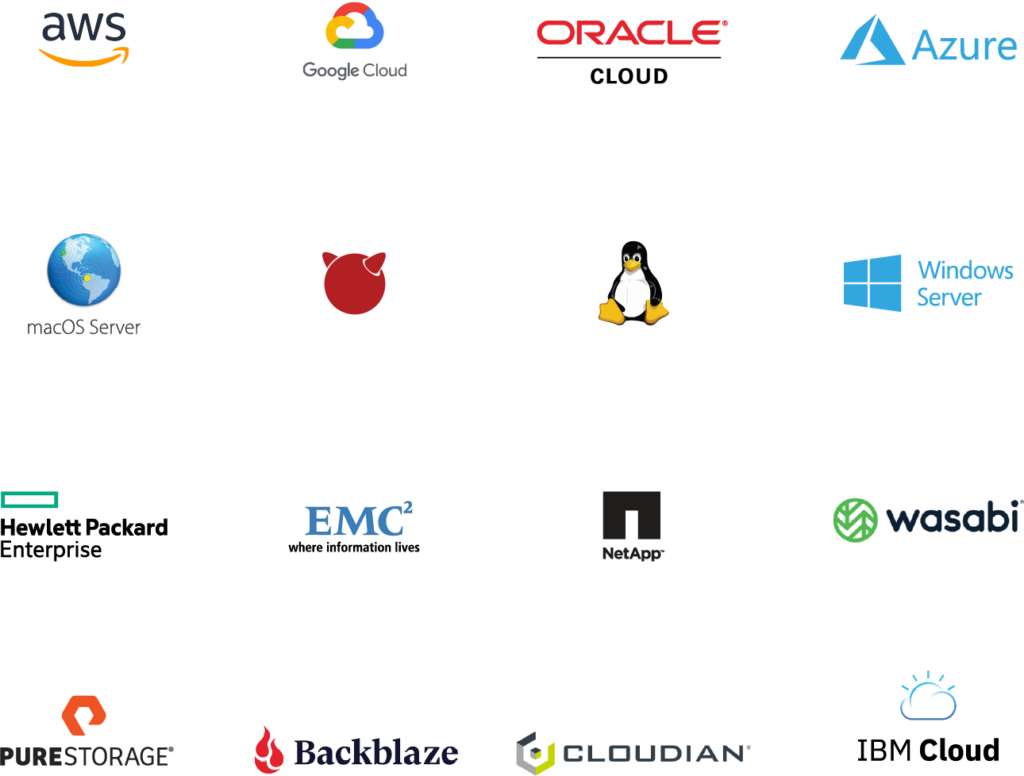
No matter your current scenario, you can install Resilio on your existing infrastructure and begin replicating in as little as two hours. This makes Resilio incredibly cost-effective, as there’s no need to invest in any new hardware or software.
Resilio’s scripting capabilities also let you easily integrate it with 3rd-party tools your team is already using, such as SharePoint, Microsoft SCCM, Ansible, and more.
Resilio’s end-user interface also eliminates any learning curves and makes it easy for crew members onboard ships to access files through an easy-to-use native file system browser. Users can:
- Easily browse and select files in folders through a familiar interface that operates much like Microsoft OneDrive.
- Perform fast, ad-hoc downloads of specific data (i.e., only the files or portions of files they need).
- Use a drag-and-drop system for easy file/data sharing over low-bandwidth VSAT links.
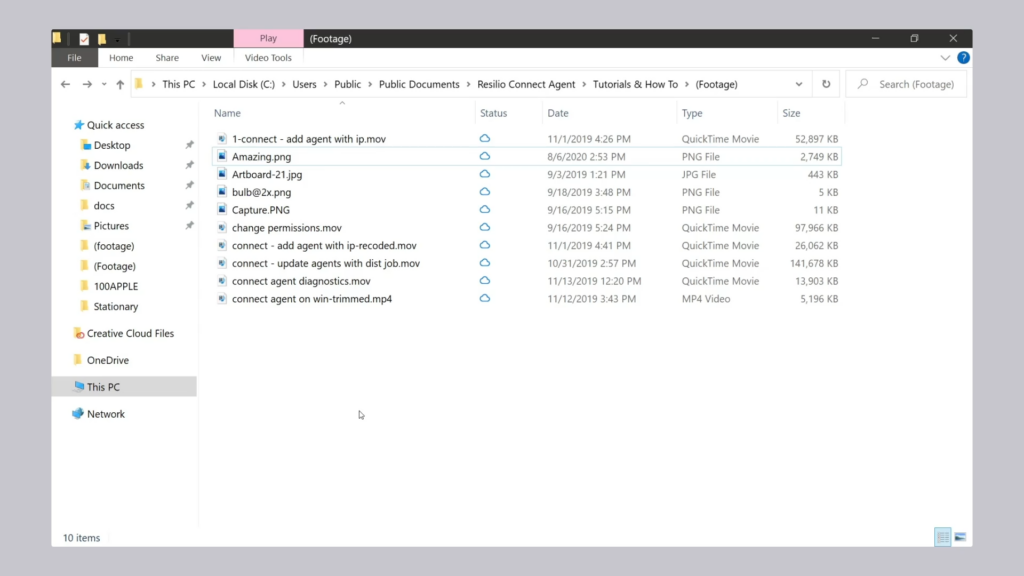
Ross Maritime is a shipping agency that streamlines the passage of vessels through the Port of Mobile, the ports of the Gulf Coast, and more. Their work requires them to track and share documents (such as customs forms, manifests, passenger logs, etc.) with many government agencies (i.e., port authorities and US customs).
Resilio’s flexibility allows them to run instances on and sync data between the Linux server in their main office and the Windows servers at each port. Resilio also provides them with network flexibility, as it automatically switches between communication channels depending on availability. And their crews can easily sync data between the Android tablets they use onboard ships.
You can read more about how Resilio enables Ross Maritime to flexibly sync data and execute their logistics operations here.
Bulletproof Security
Most file transfer solutions don’t include native security features, forcing you to invest in 3rd-party security tools and VPNs.
But Resilio Platform includes built-in security features that were reviewed by 3rd-party security experts, such as:
- End-to-end encryption: Data is encrypted at rest and in transit using AES-256-bit encryption.
- Mutual authentication: Resilio requires each endpoint to provide an authentication key before initiating a transfer, ensuring your data is only delivered to approved endpoints.
- Proxy server: Resilio provides proxy and port-forwarding options that allow you to configure outbound connections and use a single IP address behind the corporate firewall, control programmatic access of specific systems/devices, control access to specific files/folders on your machines, provide end-users with more control over where/how data is stored, and more.
- Forward secrecy: Sessions are protected with one-time session encryption keys.
- Cryptographic integrity validation: As mentioned earlier, file integrity is preserved with cryptographic validation.
- Immutable copies: Resilio stores immutable copies of files in the cloud to protect you in the event of ransomware.

Use Resilio Platform for Optimized Maritime File Transfer
Resilio Platform is the best file synchronization solution to use for maritime file transfers because it:
- Transfers efficiently over any network: Resilio’s WAN acceleration protocol fully utilizes the bandwidth of any network connection (VSAT, cell, Wi-Fi, IP, UHF). And its P2P replication architecture allows you to sync data from ship to ship to shore, so you can sync files of any size (no file size limits) across fleets of any size and in any location.
- Provides reliability and fault tolerance: Resilio automatically resumes failed file transfers at the point of interruption. It also dynamically routes around outages, preserves data integrity with cryptographic validation, and enables offline caching and syncing over LANs.
- Can be centrally managed and automated: You can visualize and monitor replication jobs across your entire fleet from one location. Resilio provides granular control over bandwidth and other replication parameters. And you can script any type of functionality your jobs require in order to automate mission-critical processes.
- Deploys easily and flexibly: You can install Resilio on your existing infrastructure using just about any type of device, operating system, or cloud storage service. And its graphic interface makes file sharing and data collection easy for everyone involved.
- Secures data: Resilio is a secure file sync solution that encrypts data end-to-end, and includes other built-in features that protect your datasets from ransomware, corruption, and interception.
Maritime organizations such as Lindblad Expeditions, Northern Marine Group, Ross Maritime, and more rely on Resilio to automate file transfers for their fleets in predictable time frames. To learn more about how Resilio can enhance your maritime operations, schedule a demo with our team.





